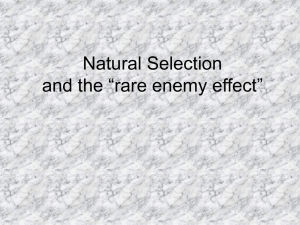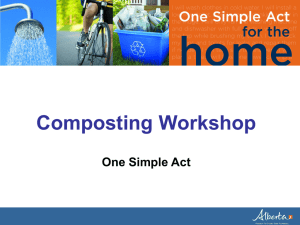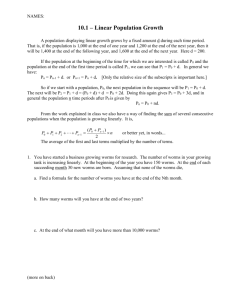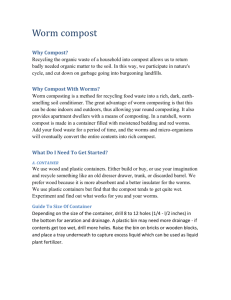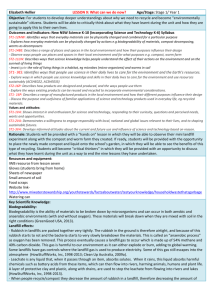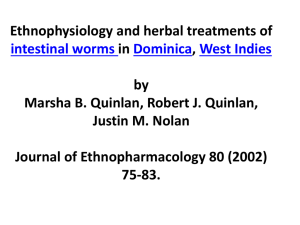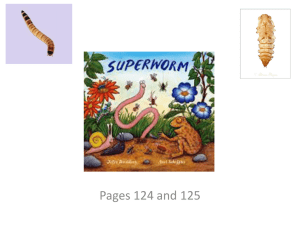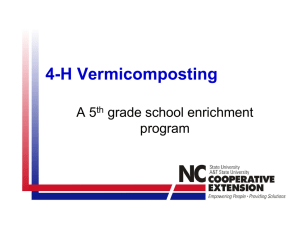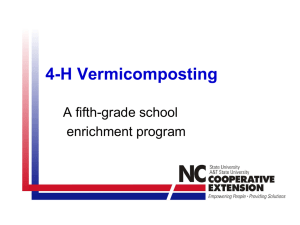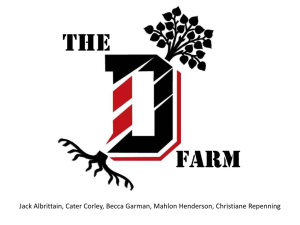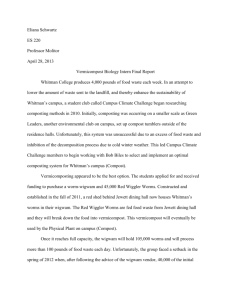Fill in File>Properties>Title, Select text F9
advertisement
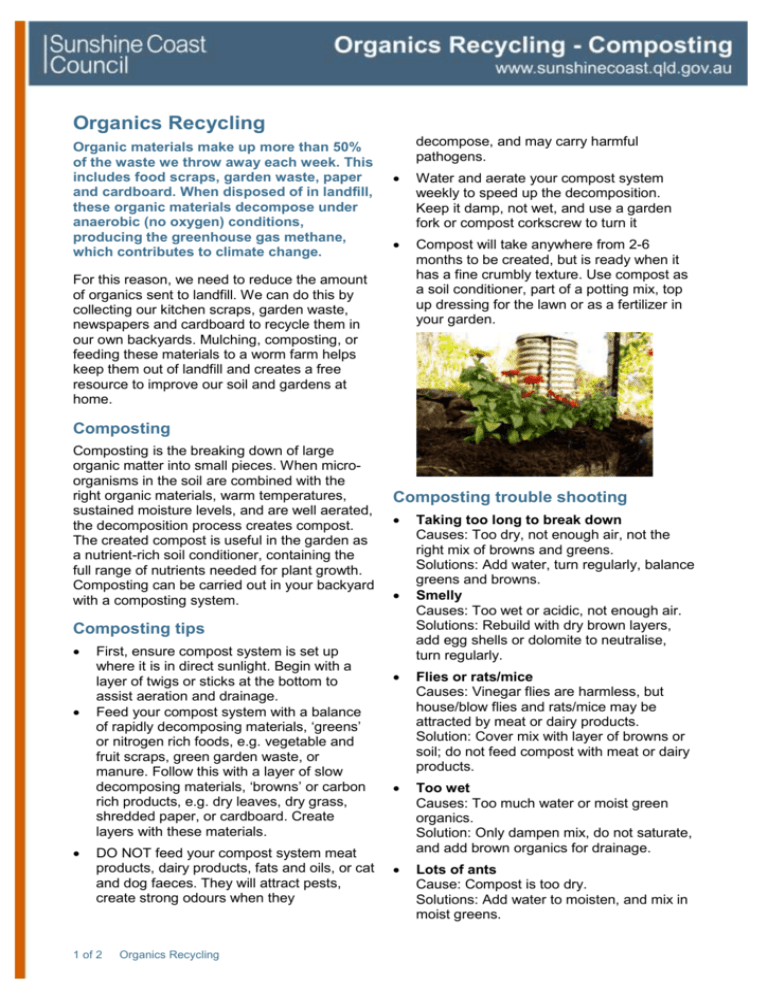
Organics Recycling Organic materials make up more than 50% of the waste we throw away each week. This includes food scraps, garden waste, paper and cardboard. When disposed of in landfill, these organic materials decompose under anaerobic (no oxygen) conditions, producing the greenhouse gas methane, which contributes to climate change. decompose, and may carry harmful pathogens. Water and aerate your compost system weekly to speed up the decomposition. Keep it damp, not wet, and use a garden fork or compost corkscrew to turn it Compost will take anywhere from 2-6 months to be created, but is ready when it has a fine crumbly texture. Use compost as a soil conditioner, part of a potting mix, top up dressing for the lawn or as a fertilizer in your garden. For this reason, we need to reduce the amount of organics sent to landfill. We can do this by collecting our kitchen scraps, garden waste, newspapers and cardboard to recycle them in our own backyards. Mulching, composting, or feeding these materials to a worm farm helps keep them out of landfill and creates a free resource to improve our soil and gardens at home. Composting Composting is the breaking down of large organic matter into small pieces. When microorganisms in the soil are combined with the right organic materials, warm temperatures, sustained moisture levels, and are well aerated, the decomposition process creates compost. The created compost is useful in the garden as a nutrient-rich soil conditioner, containing the full range of nutrients needed for plant growth. Composting can be carried out in your backyard with a composting system. Composting trouble shooting Composting tips First, ensure compost system is set up where it is in direct sunlight. Begin with a layer of twigs or sticks at the bottom to assist aeration and drainage. Feed your compost system with a balance of rapidly decomposing materials, ‘greens’ or nitrogen rich foods, e.g. vegetable and fruit scraps, green garden waste, or manure. Follow this with a layer of slow decomposing materials, ‘browns’ or carbon rich products, e.g. dry leaves, dry grass, shredded paper, or cardboard. Create layers with these materials. DO NOT feed your compost system meat products, dairy products, fats and oils, or cat and dog faeces. They will attract pests, create strong odours when they 1 of 2 Organics Recycling Taking too long to break down Causes: Too dry, not enough air, not the right mix of browns and greens. Solutions: Add water, turn regularly, balance greens and browns. Smelly Causes: Too wet or acidic, not enough air. Solutions: Rebuild with dry brown layers, add egg shells or dolomite to neutralise, turn regularly. Flies or rats/mice Causes: Vinegar flies are harmless, but house/blow flies and rats/mice may be attracted by meat or dairy products. Solution: Cover mix with layer of browns or soil; do not feed compost with meat or dairy products. Too wet Causes: Too much water or moist green organics. Solution: Only dampen mix, do not saturate, and add brown organics for drainage. Lots of ants Cause: Compost is too dry. Solutions: Add water to moisten, and mix in moist greens. Worm farming In a worm farm special earthworms, called compost worms, help recycle organic materials. They create worm castings and worm juice, which are excellent nutrient-rich organic fertilisers for the garden. The castings collect in the worm farm, and can be removed and placed directly on the garden. The worm juice is a dark nutrient-rich liquid that drains out of the worm farm, and can be collected and sprayed onto plants. Worm farms are available for purchase from nurseries, hardware stores, and the gardening section of some other stores. They come complete with instructions on how to operate and set up the farm. The worms and their bedding (the organic mixture the worm live in inside the farm) can be purchased from your local worm farmer (check your local directory). Make your own from an old bath tub and worm towers are a great way to allow casting directly into your garden. Worm farming tips First, position the worm farm so that it is protected from the sun and heavy rain. Inside the farm, cover the worms and bedding with a dampened cut to size piece of hessian sack or newspaper. This will help to keep the worms and bedding moist. Feed the worms when the last food is almost gone (amount may vary with seasons – less in winter and more in summer). Place the food in different locations underneath the hessian cover. Worms will eat the scraps of a variety of fruit and vegetables, leaves, eggshells, and tea bags. They also love a regular feed of good compost or cow manure (make sure it’s aged manure.) DO NOT feed worms meat or dairy products, fats and oils, the scraps of acidic fruits or vegetables such as lemons, onions, or garlic, as these can change the soil pH. Dampen the worm bedding and hessian/newspaper once per week. Feed your worms brown materials, e.g. leaves, shredded newspaper, or dry grass, to help to aerate the mix and ensure the worms are getting oxygen. 2 of 2 Organics Recycling Fresh worm juice can be added directly to soil, but should be diluted with to 50% water before spraying directly onto plants. DO NOT store worm juice, as it can turn anaerobic which can be dangerous to your plants. Worm farm trouble shooting Strong, bad smell Causes: Not enough air circulation, too much food in farm, improper food added. Solutions: Add brown materials, make sure bedding is not blocking air holes, feed worms less food and/or less often, remove meat, diary or oily products, add compost or shredded paper to absorb moisture. Too wet Causes: Too much water added, too much high moisture foods added. Solutions: Stop adding water, add shredded paper, put in less fruit and vegetable waste, and add a layer of cow manure or well decomposed compost. Fruit flies Causes: Food exposed or too much food. Solution: Cover food and bedding completely, feed worms less. Lots of ants Causes: Dry bedding. Solutions: Moisten bedding. Ensure bedding is covered to maintain moisture. Mites Causes: pH changes. Solutions: Test bedding with pH kit, and increase pH by adding lime or eggshells or decrease pH with sulphur. More information For further information and tips on composting and worm farming, you could participate in a workshop through our Waste 2 Resource Education program. Workshops on setting up and operating compost bins and worm farms operate regularly across the region, and are available for school or community group visits. Contact the Council Customer Service Centre on (07) 5475 7272 to make a booking.
